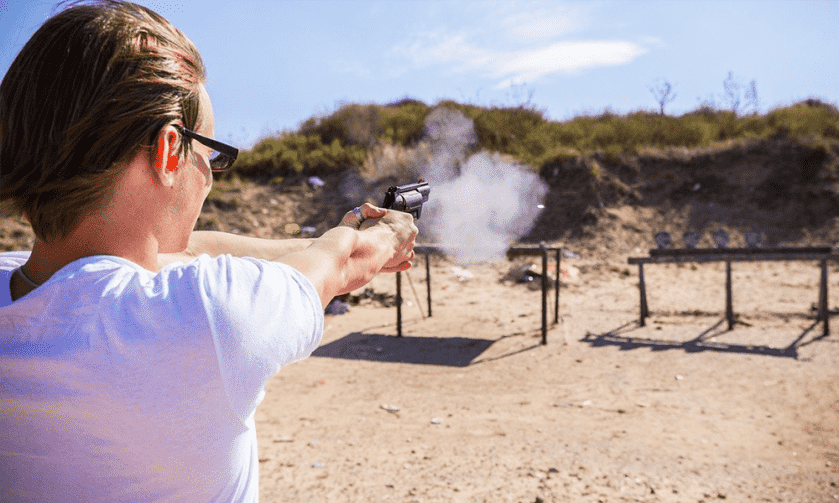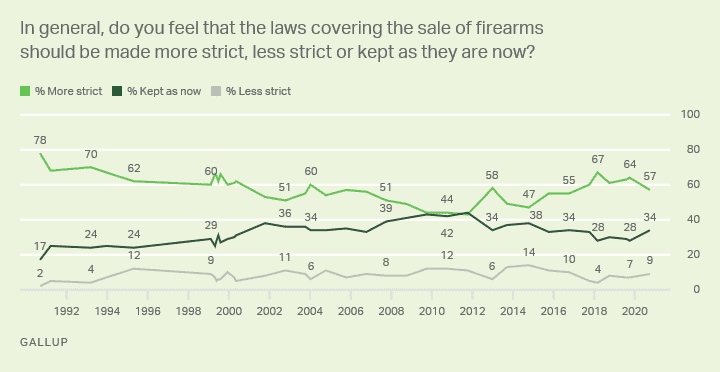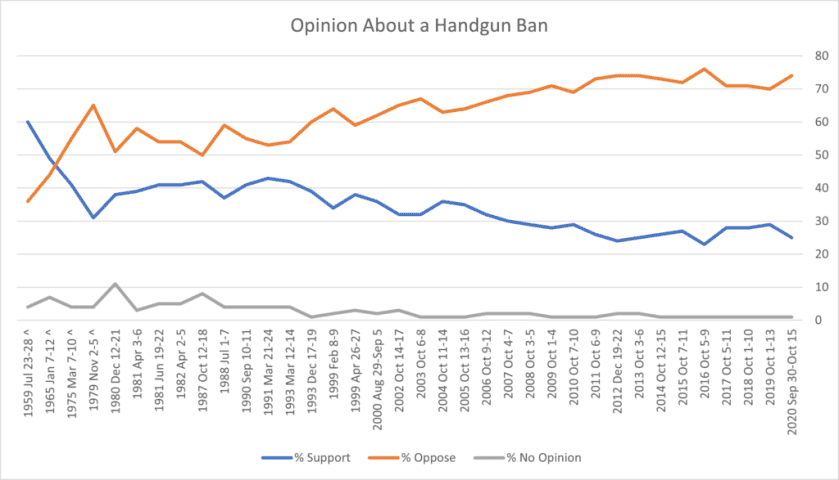
All eyes were on the Supreme Court last week as justices heard oral arguments in New York State Rifle & Pistol Association v. Bruen.
It’s the first gun rights case the Supreme Court has heard in a decade, and the result could guarantee an individual right for Americans to carry firearms outside the home.
This case would not have been possible without the meteoric growth of the concealed carry movement. That movement, in turn, both fueled and was caused by the anti-gun lobby’s greatest failure: the death of the handgun ban.
Americans’ opinions about gun control haven’t changed much in the last 30 years. Except for a brief period following Barack Obama’s election in 2008, about 55% of Americans think gun laws should be more strict, 35% want them kept as they are, and 10% think they should be less strict.

That generalized opinion, however, does not apply to handgun bans.
When Gallup first started asking about a handgun ban in 1959, 60% of Americans wanted to ban handguns, 36% did not, and 4% had no opinion.
Over the course of the next 80 years, those numbers changed dramatically.
By 1975, more Americans opposed a ban (55%) than supported it (41%). By the turn of the century, a massive majority (62%) opposed a ban, and last year, 74% opposed a ban while only 25% supported it.
What’s more, this trend has been consistent over time. Opinions about handgun bans do not seem to be affected by current events. Instead, support for a handgun ban fell into the 40s by the 1970s and dropped consistently over the next 50 years.
Support for a handgun ban has not cracked 30% since 2007.
SEE ALSO: Never Enough: Canadians Press for More Gun Control, Including Total Handgun Ban

From the perspective of the anti-gun lobby, this is an enormous failure. Handguns accounted for 62% of firearms used in murder and nonnegligent manslaughter incidents in 2019. And yet, Everytown, Giffords, and Brady have lost the support of the American people for banning the type of weapon “responsible” (according to them) for over 6,000 homicides per year.
If their public-facing rhetoric is any indication, they would prefer that Americans forget about this historic loss.
Older gun owners will remember that Brady: United Against Gun Violence began its life in 1974 as the National Council to Control Handguns and soon became Handgun Control, Inc. A sister organization, the Center to Prevent Handgun Violence, was founded in 1983.
In 2001, the organization was renamed the Brady Campaign to Prevent Gun Violence.
Same story with the Coalition to Stop Gun Violence. That organization was founded in 1974 as the National Coalition to Ban Handguns and didn’t change its name until 1989.
These organizations claim that they changed their names in order to pursue both handgun and “assault weapon” bans. That may be partly true, but even anti-gunners admit that they backed off supporting a handgun ban after the public turned against them.
For example, this 2000 article published by the ultra-radical Violence Policy Center acknowledges that the handgun ban dog won’t hunt.
“Obsessed with its search for ‘common sense’ gun control and ever fearful of being perceived as radical, most of the American gun control movement has given up on trying to ban handguns,” the author writes. “This has helped create the notion that support for a ban is absent or marginal.”
SEE ALSO: 4th Circuit Throws Out Case Overturning Ban on Selling Handguns to Adults Under 21
Support for a handgun ban may technically be present, but not in high enough numbers to attract political support.
While mainstream gun control organizations and political parties would no doubt cheer a handgun ban, none spend any political capital to promote it. Joe Biden didn’t include it in his gun control agenda, and no radical anti-gun jurisdictions have passed one.
It’s true that the 2008 Heller Supreme Court decision helped take a handgun ban off the table, and California’s gun roster is an effective handgun ban.
Still, the organizations mentioned above changed their names before Heller, when a handgun ban was still very much in the cards. In addition, states like California, New York, and Connecticut have all passed “assault weapon” bans even after the Heller decision. Why haven’t they tried doing the same with handguns?
The answer to that question should be clear from the poll above: the American people don’t want it. They want to be able to arm themselves for self-defense, and they know that handguns are often the best way to do that.
The gun-rights community faces threats for many sides, but for now, at least, we can chalk up handguns as a win.

Would the Supreme Court support a ban on detachable full capacity thirty round magazines or fifty to seventy round drum magazines? I am uncertain.
I believe over twenty-five million Americans own eleven to thirty two round magazines so this would make a ban difficult if not nearly impossible to enforce. Drum magazines are more rare.
I love my full capacity magazines. I own over twenty five magazines that hold more than eleven shots.
I really wish the short barreled rifle and shotgun laws would go away. Short barreled pistol caliber carbines and short barreled shotguns are some of the best home defense firearms.
While traveling across many states, having a CCW permit from a state with reciprocity from 32 other states isn’t enough, I had it leave my protection home because my travels took me to a few states that didn’t allow my state’s carry. How can I have my God given right of self protection denied which is promoted by a Constitutional right and still be denied? All is done through the “color of law.” And to top it off, I would not, or if, God forbid, my heirs be able to get just compensation for that state’s criminal corp due to “state sovereignty”!
A big reason they haven’t tried an outright ban of handguns is because it’s likely to get smacked down by SCOTUS, and they don’t want to risk a nationwide expansion of gun rights like we saw in the aftermath of DC v. Heller and McDonald v. Chicago.
Very true, at least in the last decade or so.